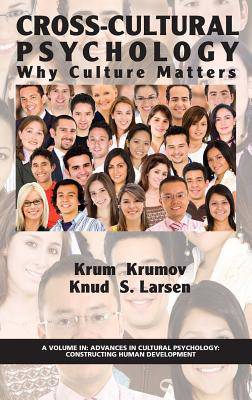
- Afhalen na 1 uur in een winkel met voorraad
- Gratis thuislevering in België vanaf € 30
- Ruim aanbod met 7 miljoen producten
- Afhalen na 1 uur in een winkel met voorraad
- Gratis thuislevering in België vanaf € 30
- Ruim aanbod met 7 miljoen producten
Omschrijving
Cross-Cultural Psychology: Why Culture Matters addresses both established and very recent research in cultural and comparative cross-cultural psychology. The book is written by Professor Krum Krumov of Sofia University in Bulgaria and Professor Knud S. Larsen from Oregon State University. The authors are long-term colleagues with extensive research experience in cultural, cross-cultural and international settings.
The book starts with a discussion of the tentative nature of cultural information given the forces of globalization and communication integration. Weighing these issues still permits for some powerful conclusions about differences that matter as well as human universals based on our communalities. The reader is also provided with a through grounding in relevant research approaches and critical thinking that provides the basis for an evaluation of the research literature.
Further, the book reports on what we know about the origin of culture, especially the forces of cultural transmission and the evidence for socio-cultural evolution. The impact of culture and psychology on human development is contrasted and evaluated. A chapter on language stresses the importance of evolutionary forces and the relationship to socio-culture. In turn that discussion sets the stage for reporting the relevant research on cognition that yields information on the impact of genetics, but also the affect of cultural evolution.
A distinct contribution is the evaluation of human happiness and emotions. The book demonstrates tangible relationships to both the universal expressions of emotions, but also the impact of cultural values on well-being. A consideration of personality theory follows in the systematic and progressive discourse in the book. Research is reported on Western, Eastern and Indigenous conceptualizations and research approaches. The discussion on the self is considered next and the authors evaluate cultural, social and comparative cross-cultural dimensions.
Finally, a discussion of sex and gender follows as associated with salient cross-cultural dimensions. The book concludes with a discussion of the affect of cultural values in organizational behavior and a consideration of the relationship between culture and human health.
Specificaties
Betrokkenen
- Auteur(s):
- Uitgeverij:
Inhoud
- Aantal bladzijden:
- 476
- Taal:
- Engels
- Reeks:
Eigenschappen
- Productcode (EAN):
- 9781623963170
- Verschijningsdatum:
- 19/04/2013
- Uitvoering:
- Hardcover
- Formaat:
- Genaaid
- Afmetingen:
- 156 mm x 234 mm
- Gewicht:
- 839 g

Alleen bij Standaard Boekhandel
Beoordelingen
We publiceren alleen reviews die voldoen aan de voorwaarden voor reviews. Bekijk onze voorwaarden voor reviews.








